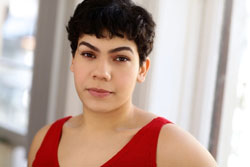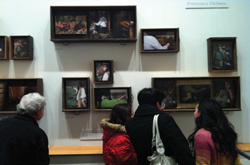Two River Theater is showcasing the enduring strength of a group of Spanish women bound together by familial relationships, language, culture and heritage. In the new play, The Women of Padilla, the multi-talented poet, playwright and actress Daniella De Jesus portrays one of the characters whose story is intertwined with the other characters and here the actress talks about her passion, including performing in a play that centers around women.
I had the pleasure of reading a short bio on your artistic achievements as an actor and a writer, in particular playwriting and poetry. Do you feel more at home in performing or writing?
I feel more safe and comfortable in writing, the actual doing of it. But having my writing read aloud and performing are equally as nerve-wrecking and thrilling.
Is this the first play you are doing at Two River Theater in Red Bank, New Jersey? If so, what has the experience been like rehearsing for The Women of Padilla?
This is my first play with Two River Theater and my first professional production, so I’m learning a lot, and it’s been a great environment to learn in. The rehearsal process has been really collaborative, which is amazing. Ken Russ Schmoll, our director, has made each rehearsal feel safe and welcoming.
The Women of Padilla sounds like a fascinating story about eight women who carry on with life as their husbands are off fighting a war. Was there anything in particular that drew you to this play?
A few things about this play resonated with me. The big one was that it revolves around eight Latina characters, which is major. It shouldn’t be, you see plays with a bunch of white cis men all the time and no one bats an eye. But, it always feels really good to be part of a production that deviates from that “norm”. I was also drawn in by how beautifully poetic and bare the language is. And I really fell in love with these characters, you feel for them. They feel like family, like they could be my family.
All the women are inextricably linked by marriage and because of that they all have the same last name Padilla. Is that significant to the experiences that each woman faces throughout the play?
The way in which these women are linked is a very significant part of the play. The fact that it’s eight sister-in-laws and not eight sisters was a very conscious choice, because it raises more questions about family: what defines a family? Do we choose family; does it choose us?
Can you tell me a little bit about Fidela, the character you portray and why she resonates with you?
Fidela is very quiet, she only speaks when spoken to or if what she has to say is important. She’s quite strange and not always all there, she’s often lost in thought, or feeling all of the world at once. I like to think of her as a broken wooden doll, the kind that don’t have faces. She’s sweet and silent, maybe a little forgotten, worn down, and sad, but she still has her place on the shelf. What drew me to Fidela was her strangeness and silence. I’m rarely called in to audition for quiet characters, so I thought it’d be a good challenge for me: figuring out how to play a character who prefers to be on the outside and interact as little as possible, while doing my job as an actor, which is to tell her story, to make sure she’s seen and heard, listening, and affecting the people around her.
In reading a synopsis of The Women of the Padilla, I noticed that it said these eight women bond over the power of food, faith and laughter. These are all topics that are relevant and insulated within Spanish culture and communities. Tell me how will these characters’ bond over food, faith, and laughter without giving too much away?
The way these characters’ bond over food, laughter, and faith is all about getting through each day. When half of your heart and half of your family is in danger fighting a war, you have to find some piece of light to get you through that time, to make a livable life, otherwise you’d give up. So throughout the play, you’ll see these women trying to find some normalcy and hope through prayer, or a joke at breakfast, or a cooking lesson.
I’m guessing it was a conscious decision by playwright Tony Meneses to make this play about women. There are no men in the play hence the title, does that make it difficult for you to connect with some of your character’s feelings regarding her husband because men are not present and you don’t get to interact?
It was a conscious choice by the playwright, Tony Meneses, that no men would exist in this play physically. I don’t think that not having those male characters’ present was a hindrance to us or our crafting of relationships in any way.
The opening night of the play is Friday April 14, at 8 p.m. For available tickets please call 732.345.1400 or email tworivertheater.org.
PHOTO COURTESY of Two River Theater




